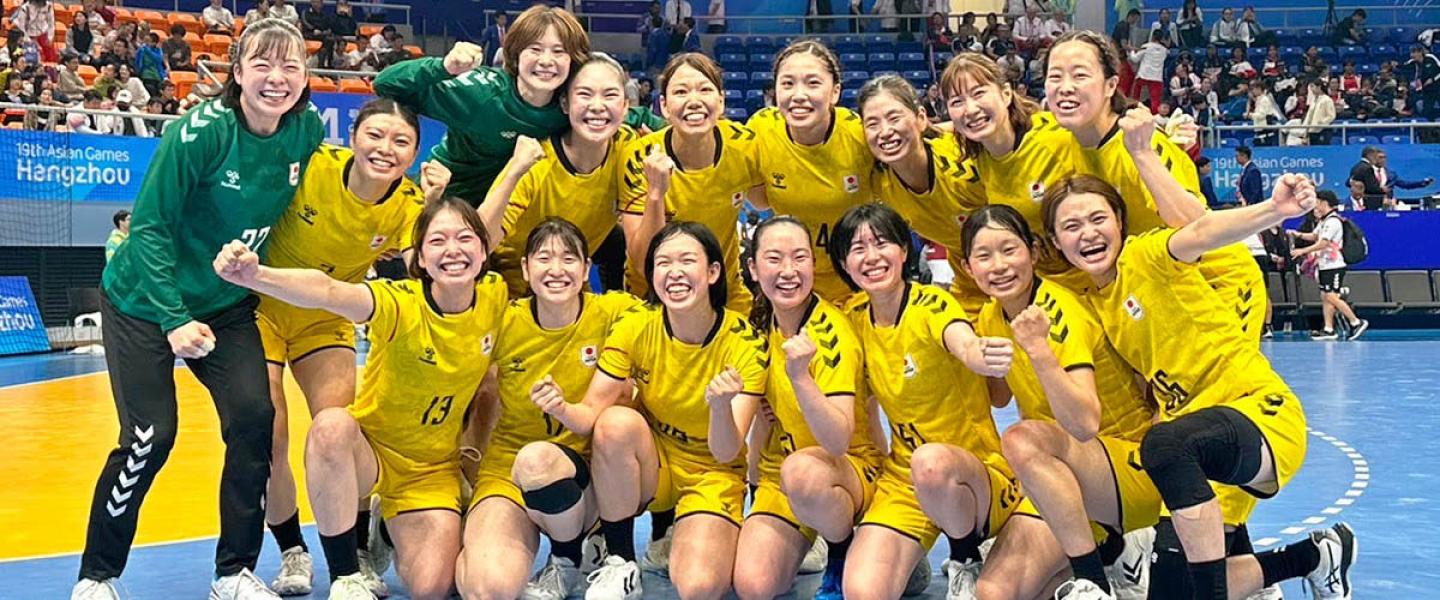Historic win for Japan, as Qatar follow suit to seal titles at 2022 Asian Games
05 Oct. 2023

Japan women’s senior national team secured their first-ever title at the Asian Games, with an outstanding display of consistency, which culminated with a 29:19 win in the final at Hangzhou 2022 against archrivals, the Republic of Korea.
In the men’s competition, Qatar became only the second team in history to win three titles in a row, sweeping their opponents, including in the final against Bahrain, where they dominated Bahrain, 32:25.
The 2022 edition of the Asian Games was supposed to take place last year in Hangzhou, the People’s Republic of China, but it was postponed due to the COVID-19 pandemic, as the restrictions in place made it impossible to host.
However, with the situation easing, the 2022 Asian Games were held in Hangzhou in September and October 2023, with the men’s and women’s handball competition being played in the Zhejiang Normal University Xiaoshan Gymnasium and the Zhejiang Gongshang University Sports Centre between 24 September and 5 October.
The men’s competition had 13 teams at the start, divided into three groups of three teams and one group of four teams, with the best two sides in each group progressing to the main round.
There were not big surprises, the only powerhouse which was left out from the main round being Saudi Arabia, who finished tied on points with the Islamic Republic of Iran, but had a +21 goal difference, as opposed to Iran’s +22, after they drew in the mutual match, 23:23.
The first two sides from each main round group went to the semi-finals, and they were the usual suspects, with Bahrain extending their winning run to five games, with a clear 34:25 win over Kuwait in the last round, while in the other group, Qatar and Japan dominated their opponents.
Qatar’s 32:29 win over Japan, where back Frankis Carol Marzo, the top scorer of the 2021 IHF Men’s World Championship, scored 11 goals, underlined their prowess in the competition, which was also there to be seen in the semi-finals, where Valero Rivera’s side took a 29:24 win over Kuwait.
While Bahrain won against Japan, 30:28, the final was set between the top two sides in Asia, but Qatar’s experience proved decisive once again. Bahrain dominated the first half, taking a four-goal lead, 11:7, which was cut to only two goals at the break, 14:12.
Another experienced Qatari player, Rafael Capote, became unstoppable in the second half, finishing the match with eight goals, as Qatar turned it around in only nine minutes, a 9:3 run creating a four-goal lead for Rivera’s side.
This was Qatar’s third consecutive win at the Asian Games, after the ones in 2014 and 2018, with Qatar becoming only the second side in history to win the competition three times in a row, after the Republic of Korea.
In the bronze-medal match, Kuwait took a 32:31 surprising win against Japan, sealing their first medal since 2006, when they won the title against Qatar.
Bahrain’s Husain Al Sayyad was the top scorer of the competition, with 43 goals, followed by Capote (35 goals) and Japan’s Taiga Tsutaya, with 35 goals.
Flawless Japan write history in the women's competition
In the women’s competition, Japan clinched their maiden title at the Asian Games, after they had previously won three silver medals and three bronze medals, with an otherworldly display against rivals the Republic of Korea in the final, where they properly dominated and took a 29:19 win.
Nine teams lined up at the start of the competition, divided into one group of four teams and another group of five teams, with the top two sides in each group progressing to the semi-finals.
Big favourites in Group A, the Republic of Korea swept their opponents with a +79 goal difference, taking a 42:16 win over Uzbekistan, a 45:14 win over Thailand and a 45:23 win over Kazakhstan, with the latter side also making it through to the semi-finals.
In Group B, Japan and the hosts, the People’s Republic of China, were the two teams which progressed, as Japan finished on the first place, after a 26:25 win in the last match of the group against the hosts, which could have easily gone the other way, after China had a 11:8 lead at the break.
Japan pulled no punches to reach the final, with a 40:22 win over Kazakhstan, while the Republic of Korea looked like the big favourites, after another clear win, 30:23, against China, with right back Ryu Eun Hee scoring seven goals.
Ryu also started the final well, scoring the first two goals for Korea against Japan, but her side failed to really get going, after beating their rivals in the 2022 AHF Asian Women’s Handball Championship final and in the Asian Olympic Qualifiers over the last 10 months.
After Japan took a 14:8 lead at the break, their extraordinary goalkeeper, Atsuko Baba, took centre stage, saving 17 shots for an outstanding 55% saving efficiency, gifting her side a 29:19 win, which meant the first-ever title won by Japan.
China’s 39:25 win over Kazakhstan meant that the hosts secured their bronze medal, their sixth in history, after China won the gold in 2010, when they hosted the competition in Guangzhou.
China’s Chan Liu was the top scorer of the competition, with 35 goals, followed by Japan’s Saki Hattori and three other Chinese players, Mengqing Jin (32 goals), Xiuxiu Tian (28 goals) and Haixia Zhang (27 goals).
Photo: Japanese Handball Association

